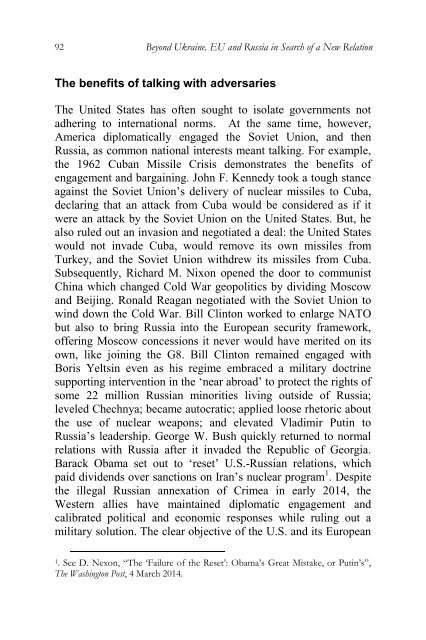beyondukraine.euandrussiainsearchofanewrelation
beyondukraine.euandrussiainsearchofanewrelation
beyondukraine.euandrussiainsearchofanewrelation
You also want an ePaper? Increase the reach of your titles
YUMPU automatically turns print PDFs into web optimized ePapers that Google loves.
92 Beyond Ukraine. EU and Russia in Search of a New Relation<br />
The benefits of talking with adversaries<br />
The United States has often sought to isolate governments not<br />
adhering to international norms. At the same time, however,<br />
America diplomatically engaged the Soviet Union, and then<br />
Russia, as common national interests meant talking. For example,<br />
the 1962 Cuban Missile Crisis demonstrates the benefits of<br />
engagement and bargaining. John F. Kennedy took a tough stance<br />
against the Soviet Union’s delivery of nuclear missiles to Cuba,<br />
declaring that an attack from Cuba would be considered as if it<br />
were an attack by the Soviet Union on the United States. But, he<br />
also ruled out an invasion and negotiated a deal: the United States<br />
would not invade Cuba, would remove its own missiles from<br />
Turkey, and the Soviet Union withdrew its missiles from Cuba.<br />
Subsequently, Richard M. Nixon opened the door to communist<br />
China which changed Cold War geopolitics by dividing Moscow<br />
and Beijing. Ronald Reagan negotiated with the Soviet Union to<br />
wind down the Cold War. Bill Clinton worked to enlarge NATO<br />
but also to bring Russia into the European security framework,<br />
offering Moscow concessions it never would have merited on its<br />
own, like joining the G8. Bill Clinton remained engaged with<br />
Boris Yeltsin even as his regime embraced a military doctrine<br />
supporting intervention in the ‘near abroad’ to protect the rights of<br />
some 22 million Russian minorities living outside of Russia;<br />
leveled Chechnya; became autocratic; applied loose rhetoric about<br />
the use of nuclear weapons; and elevated Vladimir Putin to<br />
Russia’s leadership. George W. Bush quickly returned to normal<br />
relations with Russia after it invaded the Republic of Georgia.<br />
Barack Obama set out to ‘reset’ U.S.-Russian relations, which<br />
paid dividends over sanctions on Iran’s nuclear program 1 . Despite<br />
the illegal Russian annexation of Crimea in early 2014, the<br />
Western allies have maintained diplomatic engagement and<br />
calibrated political and economic responses while ruling out a<br />
military solution. The clear objective of the U.S. and its European<br />
1. See D. Nexon, “The ‘Failure of the Reset’: Obama’s Great Mistake, or Putin’s”,<br />
The Washington Post, 4 March 2014.


